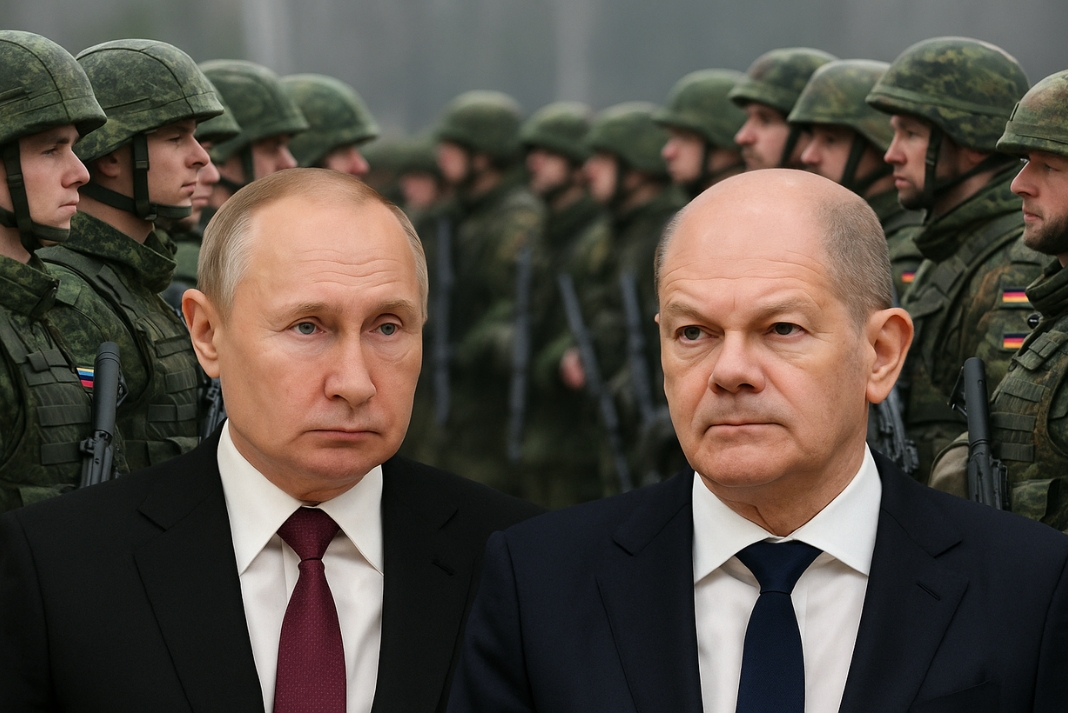Russia Terminates Historic Military Agreement with Germany, signaling the start of a new era of strategic conflict in Europe

Moscow—Russia has officially ended its long-standing military-technical cooperation agreement with Germany. This shows that structured dialogue between Moscow and Berlin has been going on for almost 30 years. The agreement, which was signed in 1996, was meant to build trust after the Cold War, make the military more open, and keep the two historical enemies working together on defense issues.
On July 19, 2025, the Russian government made an official decision, signed by Prime Minister Mikhail Mishustin, telling the Foreign Ministry to tell Berlin that the deal is no longer in effect. The decision comes at a time when relations between Russia and Germany are getting worse very quickly, mostly because Berlin is arming Ukraine more and more and its military is becoming more aggressive.
The Russian Foreign Ministry said, “This agreement is no longer relevant because of Germany’s openly hostile policies.” They also said that Berlin was systematically portraying Russia as its main enemy and bringing back threats from the Cold War.
A Pillar of Trust After the Cold War That Is No Longer Needed
After the Soviet Union fell apart, Russia signed a number of bilateral agreements with European countries, including the one in 1996. It wanted to make communication, technology sharing, and joint consultations between militaries more official. For years, it stood for a common European hope that Russia could be included in a stable, cooperative security system.
After Russia took Crimea in 2014, that vision started to fall apart. It completely fell apart when Russia invaded Ukraine in February 2022.
Germany’s Part in the War in Ukraine: A Turning Point
Germany has changed a lot since 2022. It used to be a cautious diplomatic player, but now it is Kyiv’s second-largest arms supplier after the US. Berlin has given Ukraine advanced weapons, such as Leopard 2 tanks, IRIS-T air defense systems, and long-range artillery. Ukrainian troops used tanks that Germany gave them during a raid across the border into Russia’s Kursk region in 2024. This area is a symbolic battlefield that reminds people of the biggest tank battle of World War II.
Boris Pistorius, Germany’s defense minister, recently stepped up his rhetoric by saying that German troops “must be ready to kill Russian soldiers” if deterrence doesn’t work. Dmitry Peskov, a spokesman for the Kremlin, said that “Germany is becoming dangerous again,” which is a direct reference to the militaristic legacy of the 20th century.
Other Russia–Europe Military Pacts in Danger
Russia used to have military-technical or defense cooperation agreements with several European countries, such as:
- France:Joint naval research and development (stopped after 2014)
- Italy: Weapons cooperation and training (stopped)
- Austria and Greece: Technical exchanges (not happening or not official)
- Hungary: Still has limited technical cooperation and energy alignment.
Most of these agreements are either on hold or not being used at all, especially since the war in Ukraine got worse. Russia could be getting ready to cut ties with the rest of Europe, especially with any NATO member that is seen as a direct security threat, by officially ending the German agreement, which was the most important one.
What this means for Strategy:
- Military Talk Is Now Completely Over – This agreement’s end means that Russia and Germany no longer have a formal way to talk about defense issues. This means that in the future, if there are any misunderstandings or military escalations, there will be no diplomatic way to calm things down, which raises the risk of war.
- Germany as a Real Enemy – Russia sees Germany as a co-belligerent in the Ukraine war, not as a neutral European power. This label gives people the right to do cyber operations, spy on people, or retaliate indirectly against German interests, even outside of war.
- NATO’s Eastern Position Will Get Stronger– Germany’s move toward rearmament, which includes plans to raise its defense budget to €153 billion by 2029 and bring back mandatory conscription, fits with NATO’s larger realignment. Expect more troops to move around in the Baltics and Eastern Europe, as well as more joint drills near the borders with Russia.
- The EU’s security doctrine may change – Germany’s changes could motivate other EU countries to get their militaries ready. France, Poland, Finland, and the Baltic States are already getting bigger. This could lead to a pan-European defense identity that wants to be less reliant on the U.S. and completely cut off from Russia.
The Kremlin’s bigger strategic story
Recently, Russian Foreign Minister Sergey Lavrov said that Berlin was “sliding down a path it has followed before, with tragic results.” This scary comparison to Germany’s militarism in the 20th century is part of a larger Kremlin effort to make NATO and Europe look like aggressors who are using Ukraine as a proxy to make Russia weaker.
President Vladimir Putin, on the other hand, called claims that Russia plans to attack NATO “utter nonsense.” He said that Western governments are exaggerating the Russian threat to justify their growing military budgets and take attention away from their own economic problems.
A New Normal That Is Dangerous
Ending the defense agreement between Russia and Germany is more than just cleaning up the bureaucracy. It marks the official end of a time when people worked together and talked to each other in the hopes of creating a peaceful, unified European security system. What comes next is a climate of strong deterrence, rising nationalism, and possibly new fault lines across Europe.
Russia and the West keep calling each other strategic enemies. The question now is not whether they can fix their ties, but how far this strategic break will go and what new problems might come up as a result.
The post Russia Terminates Historic Military Agreement with Germany, signaling the start of a new era of strategic conflict in Europe appeared first on Digpu News.
News